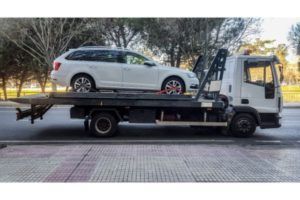Vehicle Repossession and Bankruptcy
 Do you feel like you’re at the end of your rope when it comes to balancing the finances each month? Do you feel like you tied a knot in it and hung on months ago, and the bills keep on coming? When there’s no end in sight and no way to get control of the debt that is holding you hostage, filing bankruptcy may be the best decision you can make for your future and your sanity. But before some can accept the relief that comes with bankruptcy protection, they have to get the answers to a couple of pressing questions. What will happen to my car? Will I lose my vehicle when I file for bankruptcy?
Do you feel like you’re at the end of your rope when it comes to balancing the finances each month? Do you feel like you tied a knot in it and hung on months ago, and the bills keep on coming? When there’s no end in sight and no way to get control of the debt that is holding you hostage, filing bankruptcy may be the best decision you can make for your future and your sanity. But before some can accept the relief that comes with bankruptcy protection, they have to get the answers to a couple of pressing questions. What will happen to my car? Will I lose my vehicle when I file for bankruptcy?
Repossession and bankruptcy are both scenarios we all hope to avoid, but at the same time, they are both situations that can happen to anyone. Regardless of how you got to the point of filing bankruptcy, the focus now needs to be the future. Bankruptcy is a legal tool designed for people just like you in impossible financial situations, an opportunity to turn things around. If you’re thinking about filing bankruptcy for all the right reasons, but you’re worried about how you’ll make things work if your car is repossessed, here’s some straight talk.
- Filing Chapter 7 bankruptcy is not an easy fix.
- The bankruptcy court liquidates nonexempt assets during Chapter 7 to pay your creditors. When there are no nonexempt assets with equity, the case is termed a “no asset” bankruptcy case.
- A filer’s home is sometimes an exempt asset (depending on how much equity is in the house).
- Immediately upon filing Chapter 7 bankruptcy, the automatic stay goes into effect. All collection phone calls and other contacts should stop.
- The automatic stay also applies to your auto loan lender. While the stay is in effect, your lender may not seize your vehicle.
While the lender backing your auto loan is not allowed to contact you regarding payment on your debt, an auto loan is a secured loan, and the lender could seek to repossess your vehicle, but they have to obtain court approval first. The judge is likely to lift the automatic stay if the lender can show your loan agreement and evidence that shows you are behind on your car payments.
Bankruptcy does not always stop the car repossession process, but it does slow it down to give you time to renegotiate a deal for you to keep it.
If a bankruptcy petitioner wants to fight to keep their car and a lender asks the court to lift the automatic stay, they can ask. Once the motion is filed, a court date is set (typically within a 30-day time frame). Once you’re facing the court date, you’d need to be able to show proof that the lender never notified you or that you are not past due or that the lender lost your payments to prevent the action from going forward. You might also convert your case to Chapter 13 to force your lender to receive payments under a plan.
Redeeming your vehicle may be easier while filing Chapter 7 bankruptcy as it can make it so you only need to pay the “cash value” of the car. For bankruptcy filers who wish to keep their vehicle and are upside down on their car loan, this can be very helpful.
An emerging opportunity has come up. There are numerous car dealerships who specialize in making loans to people who have just gone bankrupt. We have tremendous results in people going online and getting very beautiful cars, even though they have a bankruptcy on their credit report. Of course, the purchaser must have regular income, but the fear of filing bankruptcy with no prospect of maintaining reliable transportation is not a problem at all! Contact us to see if there might be an opportunity for you.
Bankruptcy can offer freedom to individuals and families who are stuck in impossible financial tangles, but it can also be complicated. Before making any final decisions about bankruptcy, get in touch with Kenneth C. Rannick P.C., Tennessee, and Georgia bankruptcy attorney.
The post Vehicle Repossession and Bankruptcy appeared first on Kenneth C. Rannick, P.C..











